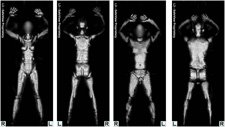Judge reads elegy for the Fourth Amendment
In the case of United States v. Lemus, police peacefully arrested Juan Hernan Lemus of Calexico, California, outside his home "before he could fully enter the doorway and retreat into his living room." With Lemus in custody, and without a search warrant for the apartment, police then entered the dwelling for a look around.
From the majority decision (which is written like a crime novel):
Diaz, in the living room, got Detective Longoria’s attention. Wasn’t there something sticking out from the couch? Detective Longoria thought it looked like the butt of a weapon. Since Lemus was a felon, having a gun would be a crime. Detective Longoria lifted the couch cushion to make sure, and confirmed that it was a semi-automatic handgun. It was later determined to be a Sturm and Ruger, 9 millimeter.Unsurprisingly, Lemus's attorneys challenged the search, which was the basis for subsequent charges unrelated to the original arrest. They pointed out that precedent permits search of the immediate area around suspects arrested in their home to assure the safety of the arresting officers, and limited protective sweeps of the full dwelling to make sure no potential allies of the arrestee are lurking in the shadows. But Lemus was already in custody, having been arrested outside. Police chose, on their own, to enter the residence.
No problem, said the district court. The majority of judges at the appeals level agreed. "Lemus was arrested in an area 'immediately adjoining' the living room, a limited search of that room was proper without either reasonable suspicion or probable cause as a protective search incident to the arrest."
But Kozinski objects (PDF):
The panel's fig leaf for this clearly illegal search is that "at most Lemus was only partially outside" of his living room door when the officers seized him. Lemus, 582 F.3d at 963. So what? Under Buie, Lemus’s location at the time of arrest is irrelevant; it's the location of the police that matters. Buie authorizes a search incident to an in-home arrest because being inside a suspect's home "puts the officer at the disadvantage of being on his adversary’s 'turf,' " ...Frankly, the majority's reasoning seems to suggest that police can conduct a full, warrantless search of your home if they arrange to arrest you within reach of your front door. Not that they would ever game such a legal rule, of course ...
Judge Kozinski points out the startling implications of the appeals court's decision to let the lower-court decision stand.
This is an extraordinary case: Our court approves, without blinking, a police sweep of a person’s home without a warrant, without probable cause, without reasonable suspicion and without exigency -- in other words, with nothing at all to support the entry except the curiosity police always have about what they might find if they go rummaging around a suspect’s home. Once inside, the police managed to turn up a gun "in plain view" -- stuck between two cushions of the living room couch -- and we reward them by upholding the search. ...Very well reasoned. Very strongly worded.
The opinion misapplies Supreme Court precedent, conflicts with our own case law and is contrary to the great weight of authority in the other circuits. It is also the only case I know of, in any jurisdiction covered by the Fourth Amendment, where invasion of the home has been approved based on no showing whatsoever. Nada. Gar nichts. Rien du tout. Bupkes.
Whatever may have been left of the Fourth Amendment after Black is now gone. The evisceration of this crucial constitutional protector of the sanctity and privacy of what Americans consider their castles is pretty much complete. Welcome to the fish bowl.
But the majority decision in favor of the "fish bowl"still stands.
Labels: kop kapers, privacy




